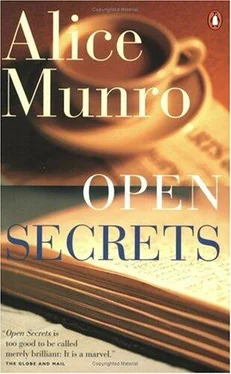“Spare me the females with the withered, painted faces,” the Notary Public said, the next time he came in. “I hope you haven’t got her lurking around anywhere tonight.”
It was true that the accountant painted her thin, intelligent, fifty-year-old face with a heavy hand, and drew on eyebrows that were like two strokes of India ink. But who was the Notary Public to talk, with his stumpy, nicotined teeth and pocked cheeks?
“I got the impression of a rather superficial fellow,” the accountant said, as if she had guessed and bravely discounted the remarks made about herself.
So much for trying to corral people into couples , I wrote to Donald. And who am I to try? I wrote to Donald regularly, describing the store, and the city, and even, as well as I could, my own unaccountable feelings. He was living with Helen, the secretary. I wrote also to Nelson, who might or might not be living alone, might or might not be reunited with Sylvia. I didn’t think he was. I thought she would believe in inexcusable behavior and definite endings. He had a new address. I had looked it up in the London phone book at the public library. Donald, after a grudging start, was writing back. He wrote impersonal, mildly interesting letters about people we both knew, events at the clinic. Nelson did not write at all. I started sending registered letters. Now I knew at least that he picked them up.
Charlotte and Gjurdhi must have come into the store together, but I did not understand that they were a couple until it was time for them to leave. Charlotte was a heavy, shapeless, but quick-moving woman, with a pink face, bright blue eyes, and a lot of glistening white hair, worn like a girl’s, waving down over her shoulders. Though the weather was fairly warm, she was wearing a cape of dark-gray velvet with a scanty gray fur trim — a garment that looked as if it belonged, or had once belonged, on the stage. A loose shirt and a pair of plaid wool slacks showed underneath, and there were open sandals on her broad, bare, dusty feet. She clanked as if she wore hidden armor. An arm reaching up to get a book showed what caused the clanking. Bracelets — any number of them, heavy or slender, tarnished or bright. Some were set with large, square stones, the color of toffee or blood.
“Imagine this old fraud being still on the go,” she said to me, as if continuing some desultory and enjoyable conversation.
She had picked up a book by Anaïs Nin.
“Don’t pay any attention,” she said. “I say terrible things. I’m quite fond of the woman, really. It’s him I can’t stand.”
“Henry Miller?” I said, beginning to follow this.
“That’s right.” She went on talking about Henry Miller, Paris, California, in a scoffing, energetic, half-affectionate way. She seemed to have been neighbors, at least, with the people she was talking about. Finally, naively, I asked her if this was the case.
“No, no. I just feel I know them all. Not personally. Well — personally. Yes, personally. What other way is there to know them? I mean, I haven’t met them, face-to-face. But in their books? Surely that’s what they intend? I know them. I know them to the point where they bore me. Just like anybody you know. Don’t you find that?”
She drifted over to the table where I had laid out the New Directions paperbacks.
“Here’s the new bunch, then,” she said. “Oh, my,” she said, widening her eyes at the photographs of Ginsberg and Corso and Ferlinghetti. She began reading, so attentively that I thought the next thing she said must be part of some poem.
“I’ve gone by and I’ve seen you here,” she said. She put the book down and I realized she meant me. “I’ve seen you sitting in here, and I’ve thought a young woman would probably like to be outside some of the time. In the sun. I don’t suppose you’d consider hiring me to sit there, so you could get out?”
“Well, I would like to—” I said.
“I’m not so dumb. I’m fairly knowledgeable, really. Ask me who wrote Ovid’s Metamorphoses . It’s all right, you don’t have to laugh.”
“I would like to, but I really can’t afford to.”
“Oh, well. You’re probably right. I’m not very chic. And I would probably foul things up. I would argue with people if they were buying books I thought were dreadful.” She did not seem disappointed. She picked up a copy of The Dud Avocado and said, “There! I have to buy this, for the title.”
She gave a little whistle, and the man it seemed to be meant for looked up from the table of books he had been staring at, near the back of the store. I had known he was there but had not connected him with her. I thought he was just one of those men who wander in off the street, alone, and stand looking about, as if trying to figure out what sort of place this is or what the books are for. Not a drunk or a panhandler, and certainly not anybody to be worried about — just one of a number of shabby, utterly uncommunicative old men who belong to the city somewhat as the pigeons do, moving restlessly all day within a limited area, never looking at people’s faces. He was wearing a coat that came down to his ankles, made of some shiny, rubberized, liver-colored material, and a brown velvet cap with a tassle. The sort of cap a doddery old scholar or a clergyman might wear in an English movie. There was, then, a similarity between them — they were both wearing things that might have been discards from a costume box. But close up he looked years older than she. A long, yellowish face, drooping tobacco-brown eyes, an unsavory, straggling mustache. Some faint remains of handsomeness, or potency. A quenched ferocity. He came at her whistle — which seemed half serious, half a joke — and stood by, mute and self-respecting as a dog or a donkey, while the woman prepared to pay.
At that time, the government of British Columbia applied a sales tax to books. In this case it was four cents.
“I can’t pay that,” she said. “A tax on books. I think it is immoral. I would rather go to jail. Don’t you agree?”
I agreed. I did not point out — as I would have done with anybody else — that the store would not be let off the hook on that account.
“Don’t I sound appalling?” she said. “See what this government can do to people? It makes them into orators .”
She put the book in her bag without paying the four cents, and never paid the tax on any future occasion.
I described the two of them to the Notary Public. He knew at once who I meant.
“I call them the Duchess and the Algerian,” he said. “I don’t know what the background is. I think maybe he’s a retired terrorist. They go around the town with a wagon, like scavengers.”
I got a note asking me to supper on a Sunday evening. It was signed Charlotte , without a surname, but the wording and handwriting were quite formal.
My husband Gjurdhi and I would be delighted—
Up until then I had not wished for any invitations of this sort and would have been embarrassed and disturbed to get one. So the pleasure I felt surprised me. Charlotte held out a decided promise; she was unlike the others whom I wanted to see only in the store.
The building where they lived was on Pandora Street. It was covered with mustard stucco and had a tiny, tiled vestibule that reminded me of a public toilet. It did not smell, though, and the apartment was not really dirty, just horrendously untidy. Books were stacked against the walls, and pieces of patterned cloth were hung up droopily to hide the wallpaper. There were bamboo blinds on the window, sheets of colored paper — surely flammable — pinned over the light bulbs.
“What a darling you are to come,” cried Charlotte. “We were afraid you would have tons more interesting things to do than visiting ancient old us. Where can you sit down? What about here?” She took a pile of magazines off a wicker chair. “Is that comfortable? It makes such interesting noises, wicker. Sometimes I’ll be sitting here alone and that chair will start creaking and cracking exactly as if someone were shifting around in it. I could say it was a presence, but I’m no good at believing in that rubbish. I’ve tried.”
Читать дальше












